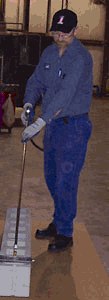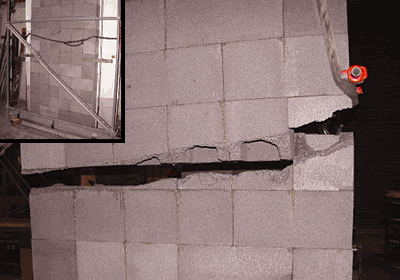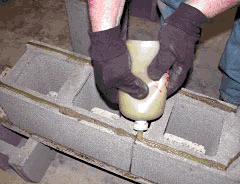New Adhesive May Give Mortar a Run for its Money
By Bill Arscott
 The adhesive can be applied two beads at a time on CMU blocks with an application wand. Photos courtesy of ITW. |
The National Concrete Masonry Association (NCMA) evaluated Mason Bond and conducted wall flexure testing in accordance with ASTM E 72-95, "Standard Test Methods of Conducting Strength Tests of Panels for Building Construction." The report issued in March 2004 concludes, "Tests here showed the adhesive achieved an average modulus of rupture of 349 psi," and "this is 5.5 to 5.9 times the bond strength required from the code."
Tim Walsh, ITW TACC Business Manager, was at the NCMA facilities when they conducted the tests. "Before we did the testing at NCMA, we did some small-scale lab testing and felt our product would be stronger than mortar, but I believe we surprised the people at NCMA with the final results," Walsh says. "We used lightweight smooth faced CMUs for the construction, and when the walls finally broke we had areas of block failure instead of bond failure. I don't think they had seen that type of failure in wall flexure testing before."
According to Walsh, the most significant advantage of the product is the potential to reduce labor costs by increasing productivity. "Mason Bond does not require mixing at the job site like conventional mortar, and it is applied as a bead using caulk tubes or a pumping system ITW TACC has developed for larger applications," Walsh says. "We have had several block manufacturers and masonry contractors evaluate the product, and they believe that using this product may double workers' productivity during wall construction. A Detroit area contractor built a few walls for evaluation, and he stated construction time was reduced by 65%."
Depending on the region of the country, labor costs generally account for a minimum of 60% of the installed cost of a CMU. Use of Mason Bond would reduce the installed cost by 30%, giving contractors a chance to improve profitability or to offer lower-cost construction and provide a competitive advantage over tilt-up concrete and poured in place concrete construction.
In addition, potential labor savings can be achieved due to the ability to use the product in different weather conditions. The use of mortar in hot (above 90 degrees F) or cold (below 40 degrees F) conditions has provisions that have extra requirements adding cost to construction. Construction with wet CMU is restricted because bond strength between CMU and mortar is reduced, which can result in construction delays. ITW TACC has performed testing in a variety of weather conditions using wet and dry blocks. Results indicate that those weather conditions did not appear to have an impact on bond strength.
 During the NCMA evaluation of Mason Bond, tests showed the adhesive with filler achieved an average modulus of rupture at 349 psi, while the adhesive without filler (pictured here) achieved 372 psi. For a similar wall type with S type mortar, the modulus of rupture is 63 psi. |
Dr. Richard Bennett, Professor of Civil Engineering at the University of Tennessee, has reviewed the report and believes there is a lot of potential for the product. "It seems to have both economical benefits and structural benefits. I think it has great potential to transform how masonry is constructed," Bennett says.
 A landscape fence corner built using Mason Bond. |
Another advantage of Mason Bond is better product consistency than conventional mortar. There is large variance in the properties of mortar because the mixing process is highly variable depending on the amount of sand and water used in the mixture. Mason Bond is a premixed product manufactured to tightly controlled specifications at the ITW TACC Polyurethane Center, resulting in minimal variability and greater consistency in the product.
Walsh acknowledges that despite its advantages it will take some time for Mason Bond to gain market acceptance. "Mortar is the industry standard, and introducing a technology that is different presents challenges. First, aesthetically this product is different. It is a thin-set adhesive, and you do not see a mortar joint. Second, mortar is a great leveling agent, and because Mason Bond is thin, it does not have the ability to level the wall. We have solutions to both of these issues, and we do not believe they are major obstacles to gaining market acceptance," he says.
Bennett agrees. "Although there are issues to be addressed, none seem to be show-stoppers," he says. "There is no reason why masonry walls couldn't be built tomorrow using Mason Bond."
 Unlike with conventional mortar, the adhesive does not require mixing, arriving premixed from the manufacturer. |
Several block manufacturers and contractors are evaluating this new mortar replacement technology and plan on performing their own tests before moving into the new market. "We have been selective on who we have worked with at this point," Walsh says. "This is a new market for us, and we want to make sure we understand all of the performance requirements for the product. We have partnered with several companies, and we are working together to make sure we test out the product as completely as possible before moving forward. At this point the results have been very encouraging, and we expect to have the product available for sale during the first quarter of 2005."
At this time, Mason Bond has not been used on a construction project, but it is expected a few projects will be completed in time to be featured at the World of Concrete this month.
For more information, contact Tim Walsh, ITW TACC Business Manager, who be reached at twalsh@itwfoamseal.com or by contacting his Lapper office at 195 DeMille Road, Lapeer, MI 48446, or calling (248) 969-4208.
About the Author
Bill Arscott was formerly the Marketing and Product Development Manager of ITW TACC.


















